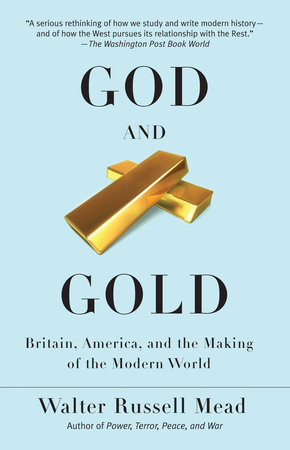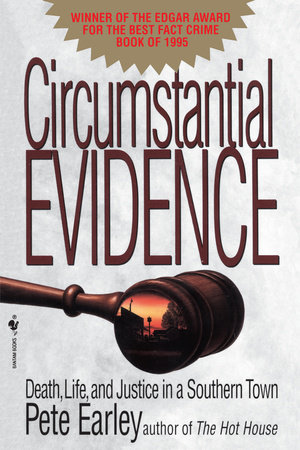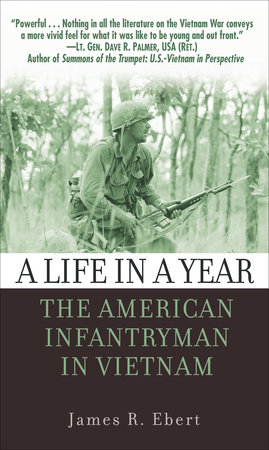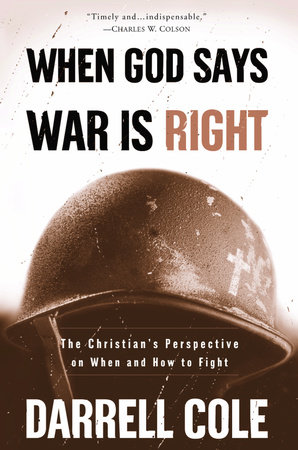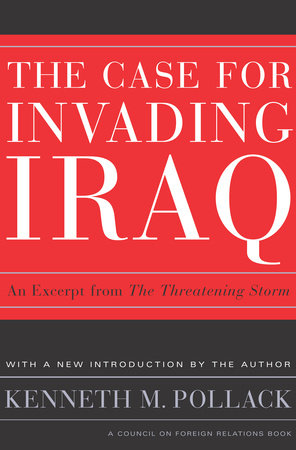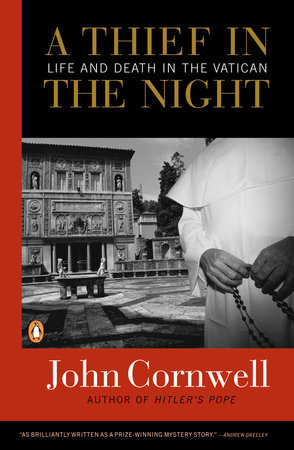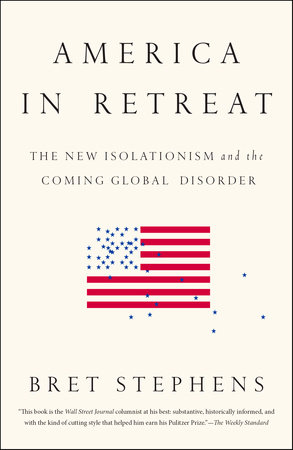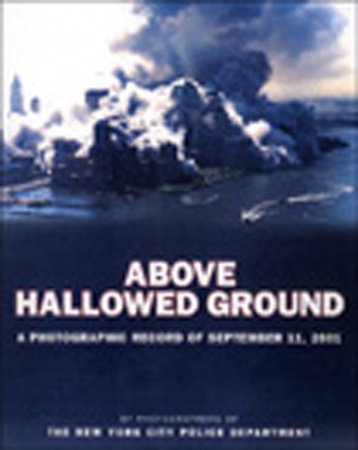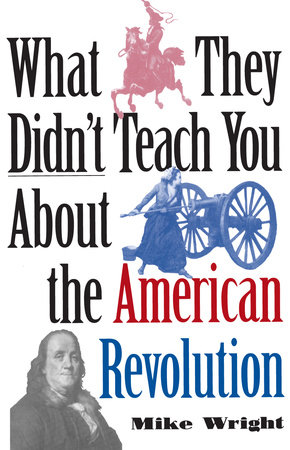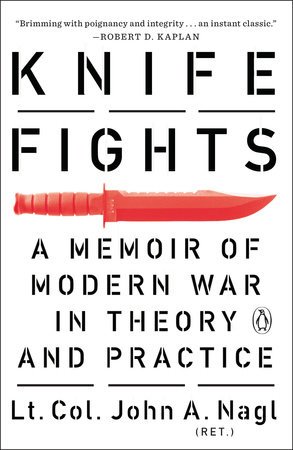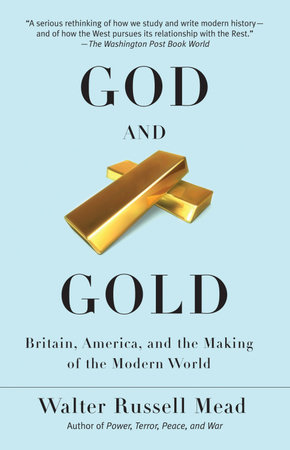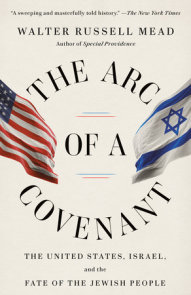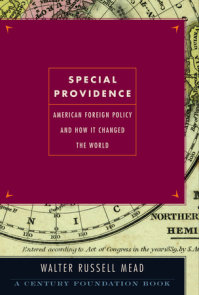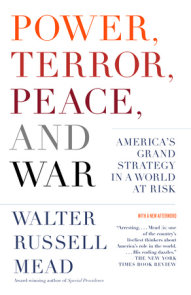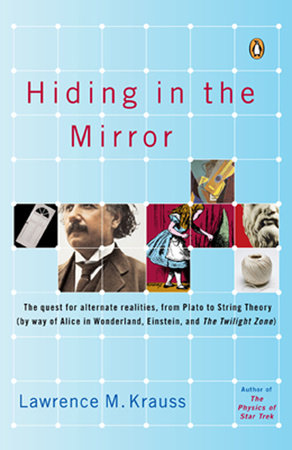Author Q&A
A Conversation with Walter Russell Mead
Author of GOD AND GOLD
1. In God and Gold you say that the conventional view of modern history is all wrong — that it is like a production of Hamlet with no Prince of Denmark. What does this mean?
The conventional wisdom says that the big story in world politics for the last 300 years has been the rise and fall of Europe. I think that’s wrong. The real story of world history has been something else: the birth, development and continuing rise of an international system of finance, politics, power and trade resting first on the power of Britain and now on the power of the United States. Despite America’s troubles under the Bush administration, that global system is more powerful today than ever.
2. God and Gold says that “the history of the modern world can be summed up in ten letters.” What letters?
This global system, which I call the ‘maritime system’ because it is based on global trade and sea power, was actually invented by the Dutch almost 400 years ago. Think of this system as the software that runs the global economy. The Dutch introduced version 1.0 in about 1600. The British introduced version 2.0 in 1700 and the United States introduced version 3.0 during World War II. Ever since 1600 the country that sets up the operating system has been the world’s most important power, and that is how I get to the ten letters. The official name for the Netherlands is actually the United Provinces of the Netherlands and Britain is formally known as the United Kingdom.
Using these initials gets you a summary of world leadership for 400 years: U.P. to U.K. to U.S.
4. Other than being superpowers, what did Britain and America do that, as you say in the title, ‘made the modern world’?
Britain and America have done more to shape the way the world lives, thinks, plays, eats (think McDonalds!) and plays than any other countries in the history of the world. Just as one example, essentially every major world sport today is played by rules developed in either Britain or America in the nineteenth century. Basketball, cricket, soccer, track and field, swimming, hockey, tennis, lacrosse, baseball, football, rugby, boxing: every one of these sports today is regulated and organized into teams and leagues based on British and American practice. Let’s not even talk about movies, television and popular music. Pentecostalism, a religious movement born just one hundred years ago at a racially integrated religious revival in Los Angeles is the fastest growing religious movement in the history of the world and now claims almost half as many adherents worldwide as Islam. The modern multinational corporation is the most successful method of organizing economic activity ever seen. The steamship, the railroad, mass production and ownership of cars and trucks, the airplane: all come from either the US or the UK.
God and Gold is a book that tries to figure out how and why all this happens and asks what, if anything it means.
5. At a time when writers like Christopher Hitchens, Sam Harris and Richard Dawkins are attacking religion, you make some very controversial statements. Do you really believe that the Anglo-American religious tradition is responsible for our liberty, prosperity and power?
Absolutely. An individualistic and dynamic form of Christianity, including the evangelical Christianity of today, was the most important single factor that shaped Anglo-American society and that propelled the British and the Americans to world power.
6. Where does that leave the Jews?
One of the most amazing things about modern history is the extraordinary synthesis between the Anglo-Saxons and the Jews. Ever since the Jews were allowed to return to England by Oliver Cromwell (they’d been banished in the Middle Ages), Jews have been making increasing contributions to the cultural, political and economic life of the Anglo-American world. Interestingly, for at least 100 years, anti-Americans have often though not always been anti-Semites as well; it is not just Osama bin Laden who thinks that the Jews and the Anglo-Americans are working together.
7. Still, you keep stressing WASP values and the importance of WASPs in American history and culture. Isn’t this exclusionary, not only of Jews but also of Americans of many different races and cultures?
When I use the word WASP I don’t mean somebody who is listed in the Social Register or has blue blood. WASP today is a state of mind, not a family tree. My own family has at least as much French background as we do English. Part of my family has Puerto Rican roots and generation by generation we keep getting more diverse.
This isn’t a new idea, by the way. As early as 1703, English poets were calling England a melting pot and mocking the idea that there was a special English ‘race’. Whatever our color and wherever our ancestors came from, however, Americans tend to share some common cultural characteristics. We tend to be individualistic, open to change, comfortable with the idea of competition, tolerant of others but committed to our own set of values, and so on. These tend to be values that originally came to the US from England, Ireland and Scotland, and the rest of us have more or less adopted them over time.
8. America may be the world’s leading power today, but isn’t that era coming to an end? Doesn’t the rise of Asian superpowers like China and India mean that the United States is about to decline?
No — I don’t think it does. In 1700, England had about one third of France’s population and about half its GDP. It was, however, England and not France that went on to organize the world. At the peak of the British Empire, Britain was responsible for about 9% of world GDP; even fifty years from now the United States is likely to have at least double that share of the global economy.
And we should remember that the great Asian powers of the future — China, India and Japan — will not always see eye to eye. Like the British and the Dutch, the Americans are very good at balance of power politics. While it’s possible that the United States could decline and fall, I think we are likely to remain a unique global power far into the future — if we stick with the values that have made us great.
9. This all sounds very triumphalist. Are you saying that Americans have all the answers?
Actually, no. Americans love our system and our values, and this makes sense for us. Why shouldn’t it? Following our instincts has made us the richest and most powerful nation in the history of the world. But other people see the world in very different ways, and if we are to have any success in building a peaceful world system, we are going to have to become much more sensitive to the ideas and the feelings of others. I don’t think we are necessarily headed for what Sam Huntington calls the ‘clash of civilizations.’ But I do think Americans need to become much better at what I call the ‘diplomacy of civilizations’ if we want our children and grandchildren to live in peace.
